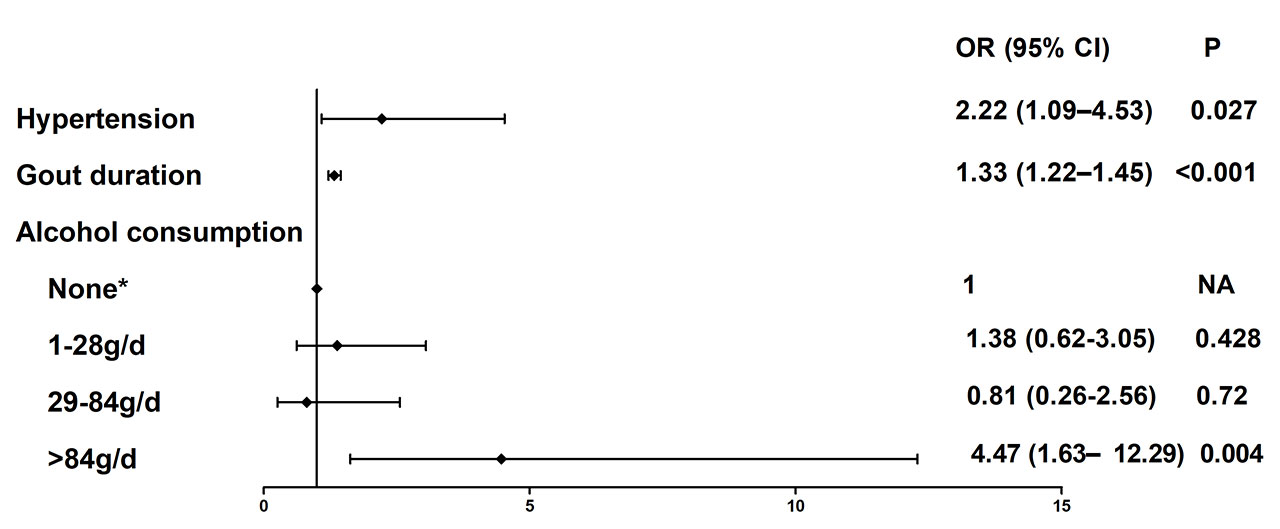Session Information
Session Type: Poster Session (Sunday)
Session Time: 9:00AM-11:00AM
Background/Purpose: Dietary factors have been recognized as risk factors of hyperuricemia and gout. However, their association with tophi formation remain elusive. The aim of this study was to identify the dietary factors associated with the presence of tophi in gout patients.
Methods: Consecutive gout patients who fulfilled the 2016 ACR/EULAR classification criteria were recruited from July 2017 to April 2019. A 10-items food frequency questionnaire was developed which included alcohol, red meat, animal offal, seafood, hotpot, slow-cooking soup, fructose-containing beverages (FCB), tea, coffee and milk/milk products. Patients were asked to report the average consumption frequency over the one year prior to the first gout attack. The alcohol intake was divided into four categories: none, 1-28 grams per day (g/d), 29-84 g/d, > 84 g/d. Intake of red meat was recorded as < 100 g/d, 101-200 g/d, 201-300 g/d and > 300 g/d. The consumption of other dietary factors were categorized as < 1 time/w, 1-2 times/w, 3-4 times/w, and > 4 times/w. Tophi was identified by physical examination, ultrasonography or dual energy CT.
Results: Among 430 recruited gout patients, 96.0% were male with median age of 39 (IQR 30-53) years and gout duration 3 (IQR 2-7) years. The median serum uric acid (sUA) was 9.3 (IQR 7.8-10.4) mg/dl. There were 14.0% gout patients consuming alcohol >84 g/d and 4.4% patients eating red meat >300 g/d. There were 41.4% patients drinking tea, 18.8% drinking FCB and 11.6% drinking slow-cooking soup >4 times/w, respectively. Tophi were identified in 77 patients (17.9%). Compared with non-tophi group , the tophi group presented higher age (median 47 vs. 38 years), longer gout duration (median 8 vs. 3 years), more affected joints (median 7 vs. 3), higher prevalence of hypertension (59.7% vs. 34.8%) and diabetes (18.2% vs. 8.5%), but lower estimated glomerular filtration rate (eGFR, 79.5±18.3 vs. 84.7±16.4 ml/min/1.73 m2, all P< 0.05). For dietary factors, there were more patients in tophi group consumed alcohol >84g/day (31.2% vs. 10.2%, P< 0.01). To evaluate the risk factors of tophi, multivariate logistic regression analysis was performed with independent variables including age, gender, duration of gout, sUA, eGFR, obesity, hypertension, diabetes, dyslipidemia, coronary heart disease and ten dietary factors, The result showed gout duration (OR=1.33, 95%CI: 1.22-1.45), hypertension (OR=2.22, 95%CI: 1.09-4.53) and alcohol intake >84g/day compared with those without alcohol intake (OR=4.47, 95%CI: 1.63-12.29) were associated with the presence of tophi (Figure 1).
Conclusion: Excessive alcohol intake may promote tophi formation.
To cite this abstract in AMA style:
Li Q, Deng C, Yang L, Liang J, Lin J, Mo Y, Dai L. Excessive Alcohol Intake Is Associated with Tophi Formation in Gout Patients [abstract]. Arthritis Rheumatol. 2019; 71 (suppl 10). https://acrabstracts.org/abstract/excessive-alcohol-intake-is-associated-with-tophi-formation-in-gout-patients/. Accessed .« Back to 2019 ACR/ARP Annual Meeting
ACR Meeting Abstracts - https://acrabstracts.org/abstract/excessive-alcohol-intake-is-associated-with-tophi-formation-in-gout-patients/

